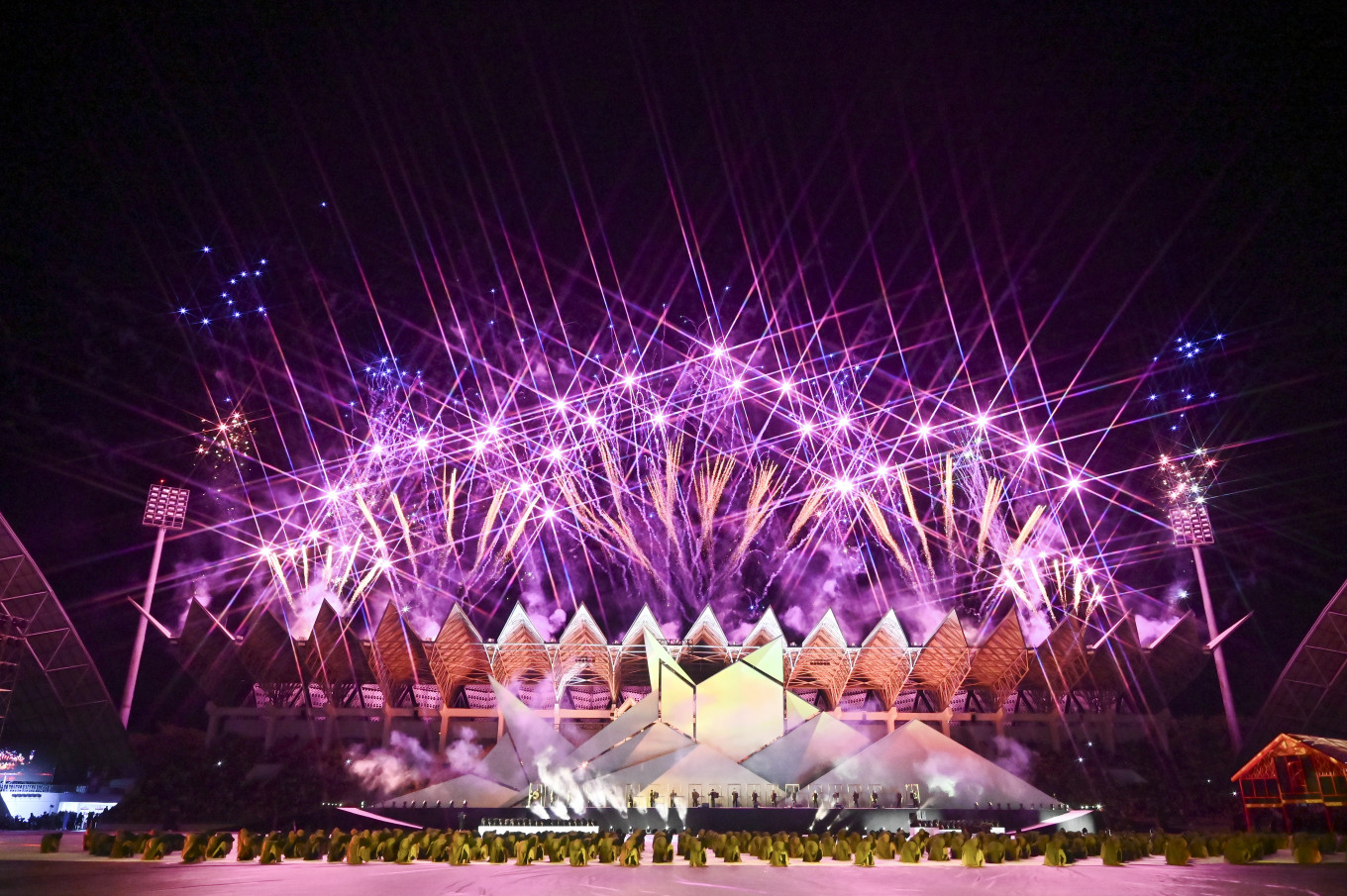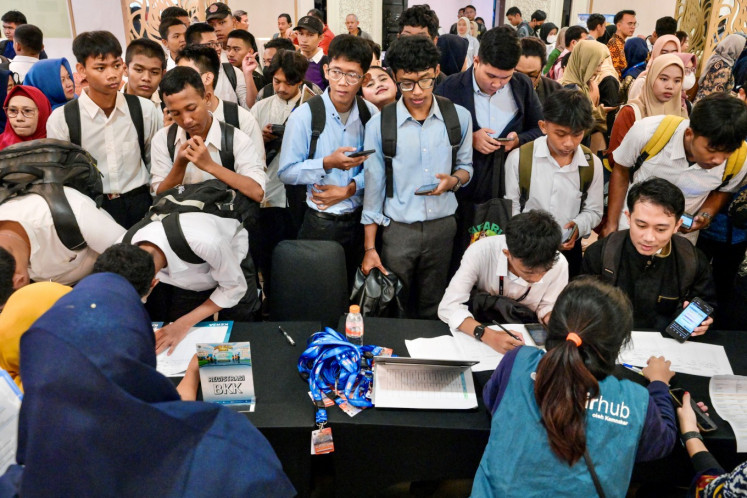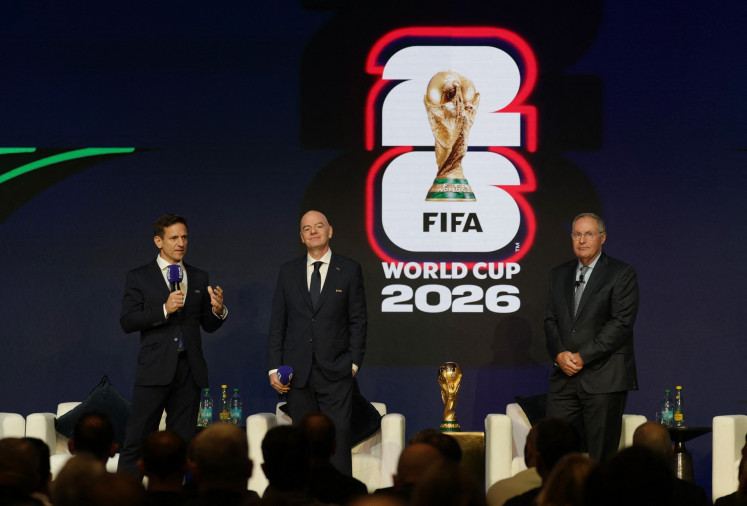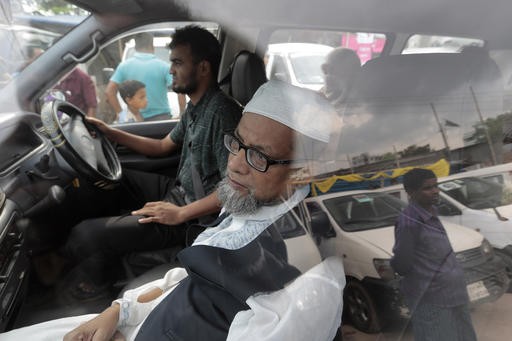Popular Reads
Top Results
Can't find what you're looking for?
View all search resultsPopular Reads
Top Results
Can't find what you're looking for?
View all search resultsSeizing the moment
The 21st edition of the National Games (PON) opened on Monday with much pomp and fanfare, marking a historic first this year with two provinces cohosting the multisport event, but the country must look beyond the visuals toward investing in sports infrastructure to facilitate the elevation of our athletes in the eastern regions to the international arena.
Change text size
Gift Premium Articles
to Anyone
 A spectacular fireworks show opens the 21st National Games (PON XXI) on Sept. 9, 2024 at Harapan Bangsa Stadium in Banda Aceh, Aceh province. Hosted in Aceh and North Sumatra (Sumut), around 13,000 athletes from 38 provinces are competing in 65 sports during PON XXI Aceh-Sumut 2024, which runs until Sept. 20. (Antara Foto/Aprillio Akbar)
A spectacular fireworks show opens the 21st National Games (PON XXI) on Sept. 9, 2024 at Harapan Bangsa Stadium in Banda Aceh, Aceh province. Hosted in Aceh and North Sumatra (Sumut), around 13,000 athletes from 38 provinces are competing in 65 sports during PON XXI Aceh-Sumut 2024, which runs until Sept. 20. (Antara Foto/Aprillio Akbar)
T
he 2024 National Games (PON), cohosted by Aceh and North Sumatra, have so far been a remarkable display of Indonesia’s sporting talent.
With around 13,000 athletes participating in 65 sports, the event showcases the depth of talent and potential that the nation has.
This year’s edition is particularly historic as it is the first time the event has been held in two provinces, underscoring the national character of the competition and its potential to strengthen unity.
While our athletes' appetite for success at the PON has been commendable, this is the time for the government to harness this opportunity to greatly improve national sports development.
Sporting achievement cannot end with the PON. The games should be a stepping stone to greater ambitions on the global stage.
The PON is not just an opportunity for athletes to compete, it is a vital part of a much larger cycle, one that leads to the Southeast Asian Games (SEA Games), Asian Games and, ultimately, to the Olympic Games.
This process is essential to Indonesia's rise in the international sporting arena, and it demands a holistic approach to investment and development in sports.
The government must now look beyond the spectacle of the PON and invest in the infrastructure and support that will allow athletes, especially those in eastern parts of the country, to thrive on the international stage.
President Joko "Jokowi" Widodo, in his opening speech at the event earlier this week, spoke about using the PON as a platform to produce world-class athletes, and this sentiment must translate into action.
The success stories emerging from the PON must be nurtured with enhanced state funding, ensuring that talent is not left untapped or underdeveloped.
Yet state investment alone will not suffice. Indonesia’s approach to sports needs to incorporate stronger financial collaboration with regional governments and the private sector.
The Rp 811 billion (US$52.7 million) spent on PON facilities is a clear indicator of how much investment is needed to prepare athletes at the national level, but to compete globally, private businesses and regional governments must play an equally significant role.
Encouraging the private sector to sponsor events, clubs and individual athletes can ease the burden on the state while fostering a more competitive and professional sporting culture.
Indonesia's current trend of tapping into foreign talent, particularly in soccer, while useful, cannot be the country’s sole strategy.
The recruitment of athletes of foreign descent has certainly given some sports a competitive edge, but it is not sustainable or reflective of the country's vast potential.
Instead, more focus should be placed on developing local talent, particularly from the outer regions, which often go unnoticed despite housing some of the most dedicated athletes.
This approach not only bolsters national pride but also ensures that sporting achievements are accessible to all citizens.
Furthermore, sports can be a powerful motivator for improving the overall health of the population.
Indonesia faces concerning challenges when it comes to fitness and health markers. According to various health studies, there is room for significant improvement in physical fitness across the population, which could be tackled through a broader engagement with sports.
Encouraging a healthier, more active population should start in schools and communities, with regional sports programs and competitions receiving greater support.
As the country cheers on its athletes returning from the 2024 Paris Paralympics, it is worth reflecting on how we can ensure that such global success becomes the norm, rather than an occasional highlight.
This can only happen if sporting investment is not limited to high-profile events like the PON or the SEA Games. Continuous, grassroots support for sports – financial, infrastructural and cultural – is needed.
Indonesia must seize the opportunity presented by the national sports week and turn it into a long-term strategy for sporting excellence.
The government, sporting associations, regions and the private sector must work together to enhance sports infrastructure and programs.
Only then can Indonesia hope to consistently compete with the world’s best while fostering a healthier and prouder population.










